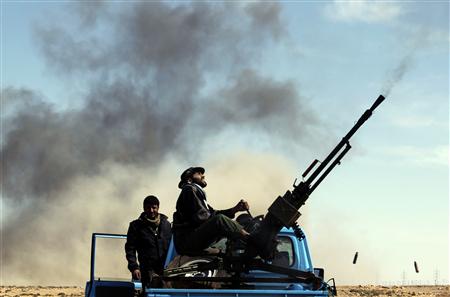Anti-aircraft fire has erupted over the Libyan capital, Tripoli, with at least one explosion shaking the city as more Western nations joined a coalition enforcing a U.N.-authorized no-fly zone over Libya.
The anti-aircraft fire and explosion were heard in Tripoli after nightfall Monday. Libyan state television said the capital was under a new attack by coalition warplanes.
Earlier, the head of the U.S. military’s Africa command said coalition warplanes carried out more patrols in Libyan airspace during the day, with seven nations participating in the mission alongside the United States.
Speaking from his headquarters in Germany, General Carter Ham said the other nations include Belgium, Britain, Canada, Denmark, France, Italy and Spain. He said the focus of the mission, which began with airstrikes on Saturday and Sunday, has now shifted to extending the no-fly zone from eastern Libya to cover Tripoli in the west.
General Ham said U.S. and British forces also fired 12 Tomahawk missiles in the previous 24 hours at Libyan military targets. He said the goal of the air and missile strikes is to protect Libyan civilians from attacks by Mr. Gadhafi’s forces, not to target the Libyan leader.
The U.S. commander also said the coalition has no mandate to provide direct support to Libyan rebels who began an uprising last month aimed at ending Mr. Gadhafi’s 42-year rule.
But, he said coalition airstrikes on pro-Gadhafi fighters who advanced on the rebels’ eastern stronghold of Benghazi had left the government troops “with little will or capacity to resume offensive operations.”
Hundreds of Libyan rebels based in Benghazi launched a counter-offensive Monday, moving south along the coast and retaking the nearby oil port of Zwitinia. The poorly-organized fighters also raced toward the town of Ajdabiya, which they lost to pro-Gadhafi forces last week. But, the rebels came under fire from government troops and were forced to pull back.
In the west, residents of Misrata said government tanks and snipers besieging the rebel-held city fired on opposition protesters Monday, killing at least nine people and wounding more than 50.
Rebels accused government troops of forcing people from neighboring towns to gather in Misrata for a pro-Gadhafi rally, creating a human shield against coalition airstrikes. A Libyan government spokesman said Misrata had been liberated from rebel control later in the day. The rebel and government claims could not be independently verified.
A U.S. military official said a British air strike on the Tripoli compound of Mr. Gadhafi late Sunday targeted his “military command ability.” The strike heavily damaged a building inside the complex. There was no word on casualties.
British Prime Minister David Cameron told the nation’s parliament Monday that the coalition has “neutralized” Libyan air defenses and made “good progress” in achieving its mission to protect civilians. He also said coalition operations had averted what he called “bloody massacre” of Benghazi residents by Gadhafi loyalists.
U.S. Defense Secretary Robert Gates said Washington expects to turn control of the mission in Libya over to its coalition partners in the coming days.
The U.N. Security Council agreed to hold a meeting on Libya on Thursday. Libyan Foreign Minister Musa Kousa had written to the council requesting an emergency session to respond to what he called military aggression against his country. He accused the United States and France of bombing civilian targets in violation of international norms.
Washington and Paris have said there is no evidence of civilian casualties from coalition operations.










